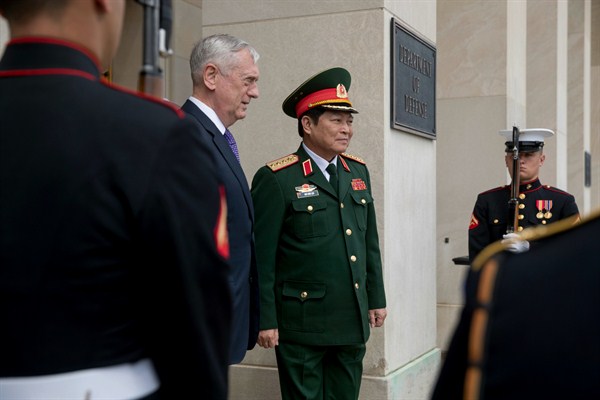Vietnamese Defense Minister Ngo Xuan Lich’s visit to Washington in early August was just the latest sign of the remarkable progress made in security ties between the United States and Vietnam over the past decade. But it also underscored the limits of how much Hanoi is willing to cozy up to Washington today, and how unconvinced it remains of the Trump administration’s commitment to Asia.
The trip exemplified Hanoi’s multidirectional foreign policy, which rests on maintaining strong relations with many outside partners to avoid dominance by any one, and of how that strategy is evolving to face the growing threat Vietnam perceives from its northern neighbor, China. For Hanoi, the United States plays an increasingly significant role. Looking at the breadth of today’s relationship, it is easy to forget that it has barely been 20 years since the U.S. and Vietnam normalized diplomatic relations. The bilateral relationship during the 1990s and 2000s focused heavily on tackling legacy issues from the war, people-to-people exchanges, and boosting economic ties. At the start of the Obama administration, the notion of direct arms sales, joint training or U.S. warship visits to Vietnamese ports were all long-term hopes, not short-term deliverables. But the calculus in both capitals changed rapidly with the escalation of tensions in the South China Sea starting around 2009.
The Obama administration’s so-called “pivot” or “rebalance” to Asia benefited from the rising distrust of China across the region. The pivot was never all about China, and it was much broader than just security ties. But the Obama administration owed the strategy’s successes as much to China’s missteps as to its own efforts. Nowhere was this clearer than Vietnam, where fear of Beijing made previously off-the-table ideas suddenly more palatable. From a landmark visit by then-Secretary of Defense Leon Panetta to Cam Ranh Bay in 2012 to the relaxation of the U.S. ban on arms sales to Vietnam, the security relationship made more progress in the span of five years than it had in the previous 20.

